
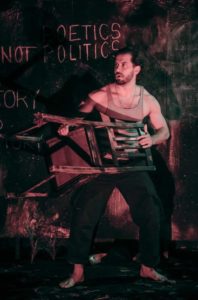 Highly Recommended **** Much of the nationalist fervor gripping Europe is being fueled by opposition to Muslim migrants, but it had long been simmering due to tensions over migration from the poor, post-communist countries in the east to the wealthier ones in the west. Which brings us to Occidental Express, a play by Romanian playwright Matei Visniec, translated by Nick Awde, now being directed by Hungarian adaptor István Szabó K. at Trap Door. Episodic and poetic, Occidental Express is made up of slices of life from post-communist Europe depicting the complex relationship of their people with the countries they admire but are suspicious of, where they are officially welcome but widely disliked, and where traumas from wars and generations of repression are never far from the surface. With a wry tone and a vast number of strategies for creating unique pictures on a mostly empty stage, Szabó and the seven-person ensemble communicate deep-seated frustration and longing with an emotional clarity to match their cerebral style.
Highly Recommended **** Much of the nationalist fervor gripping Europe is being fueled by opposition to Muslim migrants, but it had long been simmering due to tensions over migration from the poor, post-communist countries in the east to the wealthier ones in the west. Which brings us to Occidental Express, a play by Romanian playwright Matei Visniec, translated by Nick Awde, now being directed by Hungarian adaptor István Szabó K. at Trap Door. Episodic and poetic, Occidental Express is made up of slices of life from post-communist Europe depicting the complex relationship of their people with the countries they admire but are suspicious of, where they are officially welcome but widely disliked, and where traumas from wars and generations of repression are never far from the surface. With a wry tone and a vast number of strategies for creating unique pictures on a mostly empty stage, Szabó and the seven-person ensemble communicate deep-seated frustration and longing with an emotional clarity to match their cerebral style.
The first thing we see is an elderly blind man (Michael Garvey) at a Romanian train station. He is there with his niece (Emily Nichelson), who doesn’t have much patience for his child-like desire to touch the Oriental Express as it barrels through on an express trip to Paris. This is important for him, he insists. He fought against fascism in World War II, was betrayed by the Soviets and imprisoned in a Siberian gulag, and was imprisoned again trying to escape to Austria. He fought for the west’s freedom and all the things in it he loves (though isn’t very familiar with). But just as quickly, his mood sours and complains the west betrayed him, too. Nobody pays him much mind. Onboard the train, a director (Dennis Bisto) leads a troupe of entertainers in a faux-Gypsy wedding meant to amuse rich foreigners. The entertainers would call it a bastardization of their culture, but they’re not sure it’s really their culture that’s being bastardized.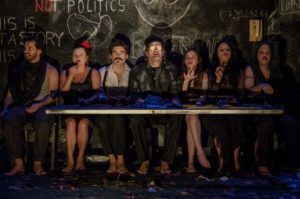
The scenes of life in the Balkans vary in tone. Some are darkly humorous, such as when a streetwalker interrupts her seductions to yell over the phone at her catsitter. One scene of prisoners awaiting torture is so chilling and upsetting an audience member had to step out for a moment. Beata Pilch ruefully delivers a monologue that describes the entirety of a life made miserable by self-destructive mental patterns, and Nicole Wiesner does the same later with an even more sinister twist. Indeed, all the actors use Awde and Visniec’s language and anecdotes to convey feelings that seem informed by decades of commonplace experiences. In a few places, the descriptions become vivid extended metaphors which arise naturally from the characters’ way of speaking, with appropriate sarcasm, crudity, and exasperation. Dark though some of the subject matter is, the poetry is a pleasure to listen to.
Some parts of Visniec’s play will undoubtedly resonate most with people who are closest to the cultures he talks about. But Szabó’s directing style gets to the emotional core of each episode, making each easily comprehensible 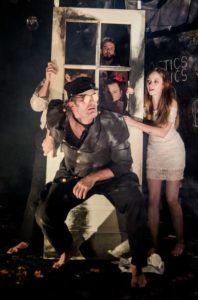 even to a person unused to his staging techniques. The night I attended, some audience members who had never been to a Trap Door show before and didn’t know what to expect left saying they were blown away by the performers’ skill. Although feelings of cultural inferiority are one of the major themes of Occidental Express, the staging itself is a testament to the vibrancy and creativity of eastern European theatre. And a few of the scenes are quite funny, interplaying with the rawness of the grimmer ones. Many people intellectually know that to those who live with the legacy of the Iron Curtain, open borders are precious, even redemptive. But Occidental Express allows us to feel, for a moment, some of what a unified Europe means to people who long felt trapped physically and mentally, and why, even as Euroskeptic parties are enjoying increased support, so many former Communist bloc countries are still eager to join a union that represents acceptance in the wider world.
even to a person unused to his staging techniques. The night I attended, some audience members who had never been to a Trap Door show before and didn’t know what to expect left saying they were blown away by the performers’ skill. Although feelings of cultural inferiority are one of the major themes of Occidental Express, the staging itself is a testament to the vibrancy and creativity of eastern European theatre. And a few of the scenes are quite funny, interplaying with the rawness of the grimmer ones. Many people intellectually know that to those who live with the legacy of the Iron Curtain, open borders are precious, even redemptive. But Occidental Express allows us to feel, for a moment, some of what a unified Europe means to people who long felt trapped physically and mentally, and why, even as Euroskeptic parties are enjoying increased support, so many former Communist bloc countries are still eager to join a union that represents acceptance in the wider world.
Occidental Express will continue at Trap Door Theatre, 1655 W Cortland Ave, Chicago, thru November 18, with performances as follows:
Fridays: 8:00 pm
Saturdays: 8:00 pm
Tickets are $20-25 with 2 for 1 admissions on Fridays. To order, call 773-384-0494 or visit TrapDoorTheatre.com.
Running time is ninety minutes.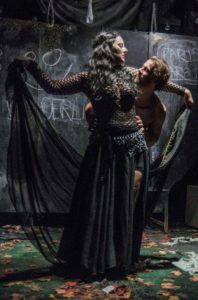
Metered parking is available in the neighborhood.
To see what others are saying, visit www.theatreinchicago.com, go to Review Round-Up and click at “Occidental Express.”

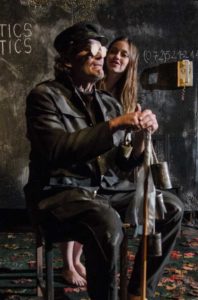

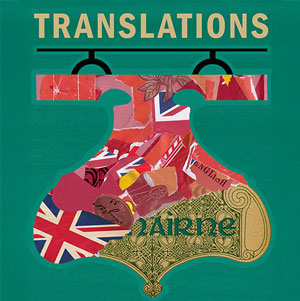


More Stories
“Translations”
“The Firebugs” reviewed by Julia W. Rath
“The Book of Grace” Al Bresloff with another from Paul LIsnek